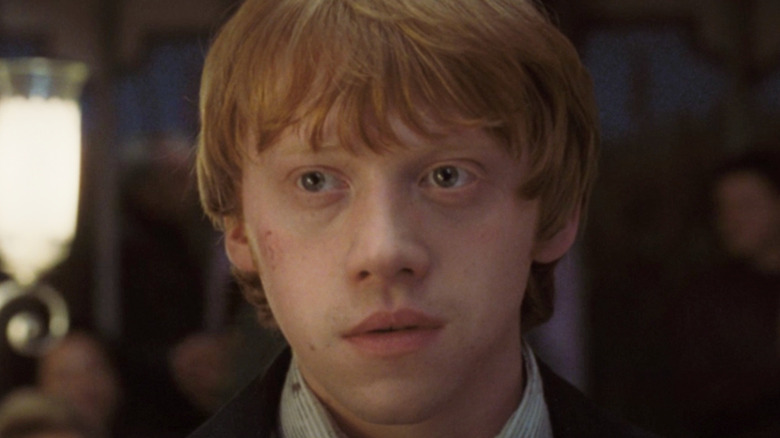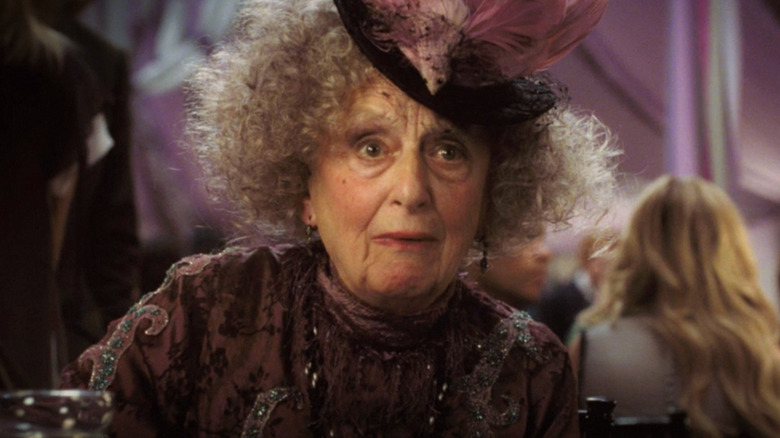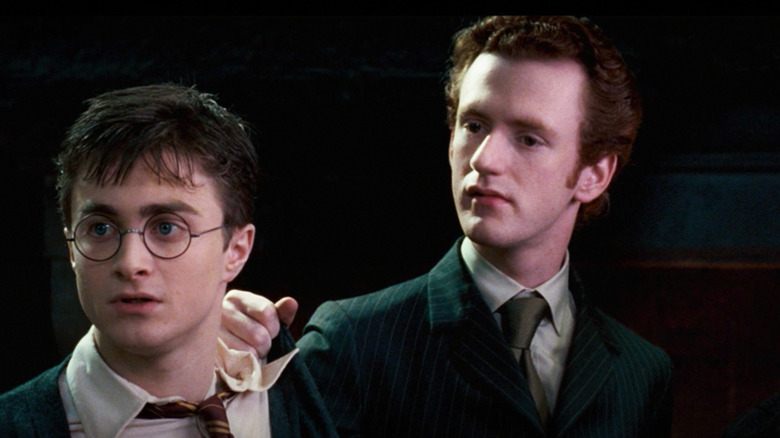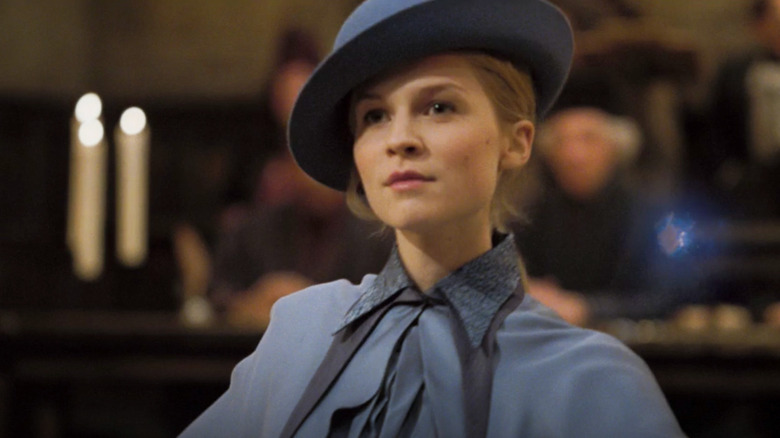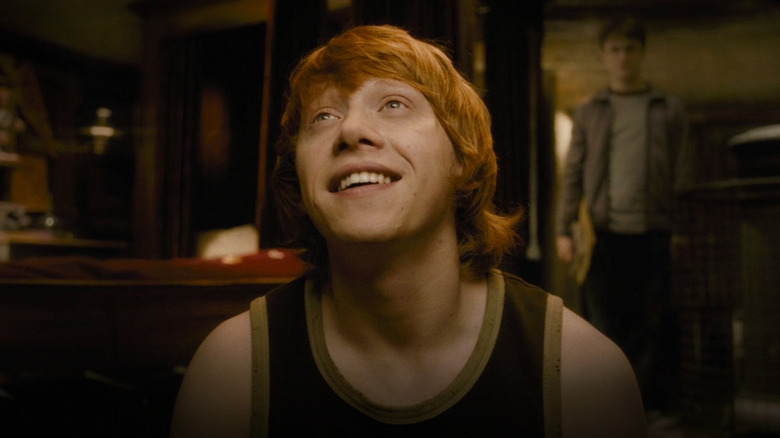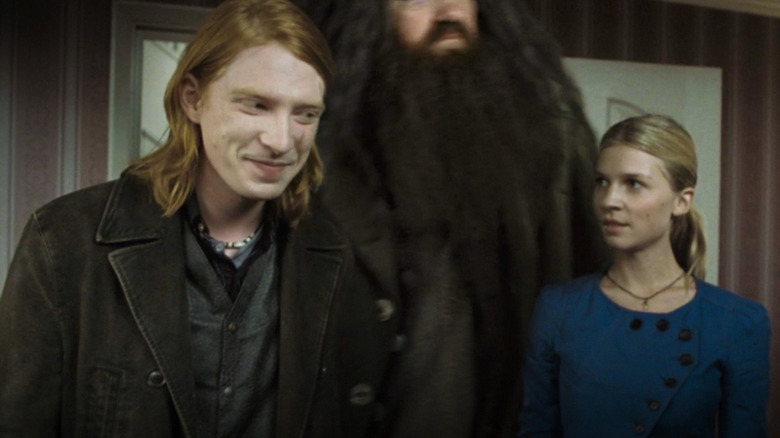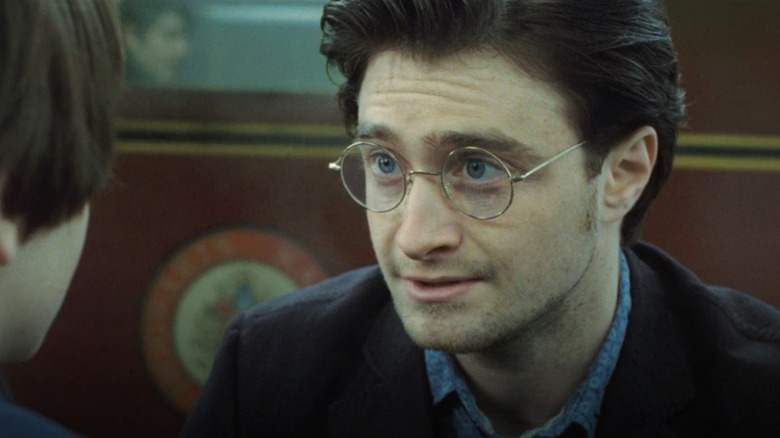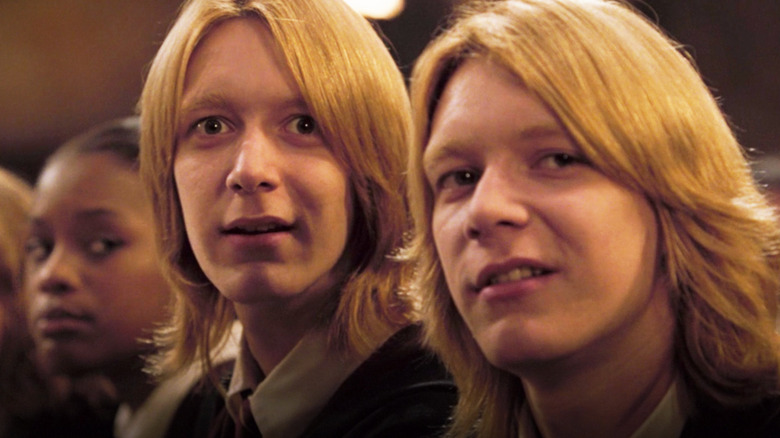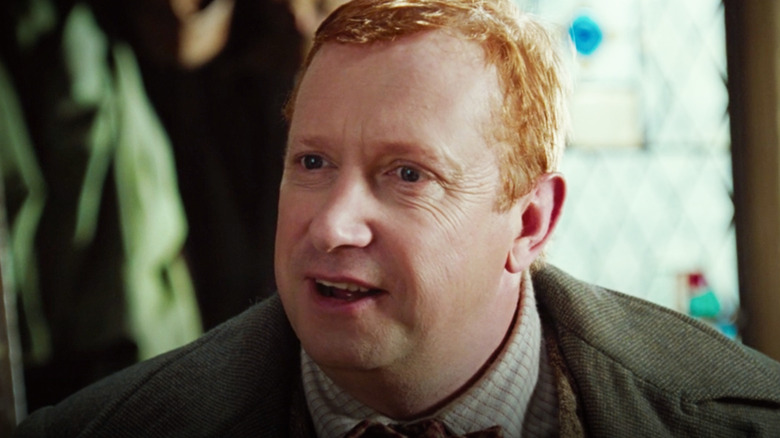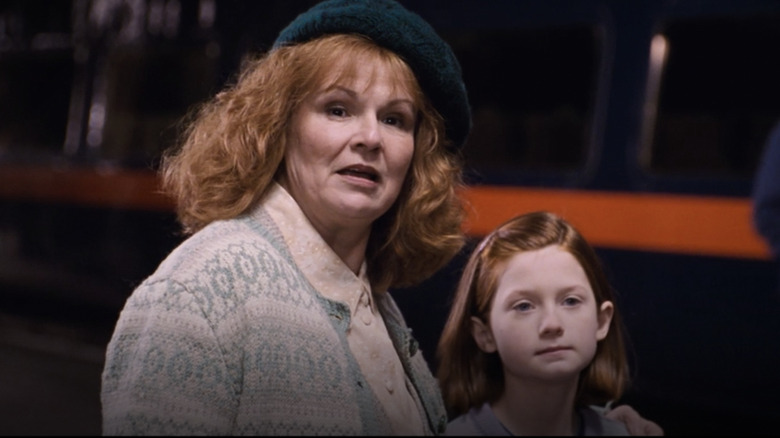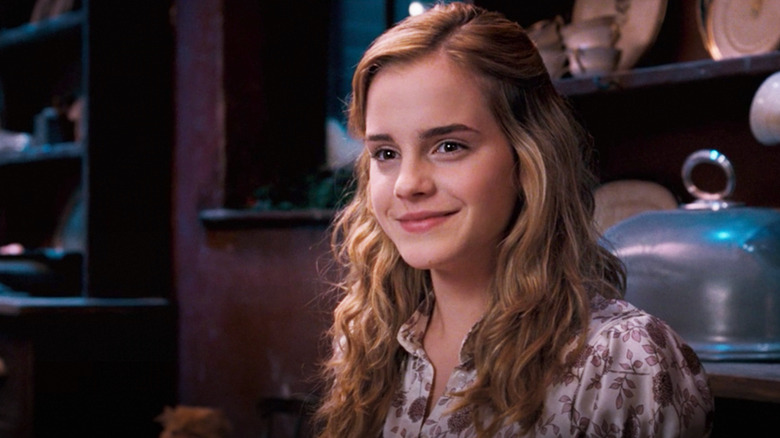Every Weasley In Harry Potter Ranked By Likability
The world of "Harry Potter" is filled with various wizard families, none more ubiquitous than the Weasleys. Sure, it's Harry's name on the covers of all the books, but in terms of sheer volume, the Weasley clan represents a disproportionate percentage of the series' major characters, and Harry himself is in essence an adopted member even before eventually formalizing the arrangement by marrying into it.
Considering that his two best friends, Ron Weasley and Hermione Granger, wind up married by the end, all three central protagonists can functionally be seen as Weasleys. But there is more to the family's importance than just their sheer numbers. Symbolically, the Weasleys represent the concept of home, the sense of belonging that Harry discovers in the wizarding world (it's no coincidence that the family residence, the Burrow, is the series' second-most frequented setting — outside of Harry's other adopted home, Hogwarts).
This symbolism only works, of course, if the Weasleys are inherently likable. They are the family Harry chooses to be part of, and as such, they need to present themselves as a family anyone would want to join. For the most part, "Harry Potter" pulls it off, while also acknowledging that you're not always going to like everyone in your family. So how likable are the Weasleys? Stacking them up against each other, insight can be drawn into which family members actually live up to the Weasley hype.
Honorable mention: Muriel
Muriel, great-aunt to Molly Weasley and great-great-aunt to her children, is an honorable mention here for two reasons. First, she's the least significant Weasley in terms of screen time, only appearing in a single scene in "Harry Potter and the Deathly Hallows." She does make it into one of the movies, played by Matyelok Gibbs (which is more than one of these characters can say) but her role is limited, to say the least.
Second, she's terrible.
Muriel is by far the least likable member of the Weasley family. Blunt, unpleasant, and quick to gossip, she's the embarrassing older relative who shows up to your brother's wedding, drinks heavily, criticizes the way young people wear their hair in this day and age, and loudly insults the memory of someone who has recently died. In this case, the deceased in question is Albus Dumbledore, whom Muriel is more than happy to disparage, with help from some "facts" provided by glorified gossip columnist Rita Skeeter. The film version softens her somewhat, but in the books, she is positively gleeful about Skeeter's findings, and in revealing the tabloid version of Dumbledore's history, she unwittingly contributes to the slow breakdown of Harry's faith in Dumbledore throughout "Deathly Hallows."
It should be acknowledged that, off-screen, Muriel has opened her home to the Order of the Phoenix and harbors the rest of her family when they are targeted by Voldemort. Even the worst member of the Weasley clan, somehow, is a little likable.
10. Percy
The "Harry Potter" movies were never going to be able to include everything from the books, and one unfortunate casualty of this was Percy Weasley, who has one of the series' deeper character arcs despite not having a major role. While Chris Rankin plays him in six of the films, he only has dialogue in the first three, and his appearance as a Ministry of Magic underling in "Harry Potter and the Order of the Phoenix" goes entirely unexplained.
Fans of the books, however, know Percy as the uptight, ambitious rule-follower who chose his career over his family, actively supporting both the willfully ignorant Cornelius Fudge and the blatantly evil Dolores Umbridge during the Ministry's persecution of Harry in the wake of Voldemort's return (which they refused to acknowledge). Percy's loyalty to the Ministry estranged him from the rest of the Weasleys for three full books, and his humbled reconciliation with them is one of the highlights of "Deathly Hallows."
This reconciliation, however, doesn't make Percy any more likable. At best, he's annoying, gullible, and obsequious, eager to do whatever it takes to rise through the ranks of the Ministry. At worst, he's a willing tool of a government propaganda machine who parrots every official story, doesn't seem to care if his family members live or die, and refuses to give up his Ministry loyalties until it's been entirely taken over by Voldemort. No apology, no matter how heartfelt, is enough to make you like him after that.
9. Fleur
Of the three characters on this list who are met prior to their becoming a Weasley, Fleur Delacour is the least prominent.
A French witch whose enrapturing beauty can be at least partially attributed to her magical veela descent, Fleur is first seen in "Harry Potter and the Goblet of Fire," where she represents Beauxbatons Academy of Magic in the Tri-Wizard Tournament. She doesn't acquit herself particularly well in the competition (though to be fair, it had secretly been rigged) but becomes friendly with Harry and ends up staying in England, working part-time at the goblin bank, Gringotts, to improve her English. It's through this work that she meets Bill Weasley, with whom she falls in love and eventually marries.
For much of her screen time, Fleur is snobbish, arrogant, keenly aware of her own beauty, and highly critical of her husband's family — there's a reason that Ginny, Bill's younger sister, begins referring to her as "Phlegm." Like Percy, she eventually reconciles with the Weasleys, particularly with their mother, Molly, after Bill is wounded by a werewolf, but unlike Percy, she makes good with the family at the end of "Harry Potter and the Half-Blood Prince," giving her the entirely of "Deathly Hallows" to demonstrate a more likable character. During that book, she provides shelter for refugees, heals their wounds, and fights against Voldemort and the Death Eaters in the Battle of Hogwarts. Your mileage may vary with Fleur, but she does tend to grow on a person over time.
8. Ron
Some might consider this a controversial ranking, but Ron kind of sucks. Sure, he's one of the three main protagonists of the story, he's the predominant Weasley representative in the series, and there's enough going on with his character to make him at least mildly interesting, but would you really want to hang out with him?
Ron's primary character trait is his deep insecurity. He's sensitive about being poor and having second-hand possessions, he feels marginalized by the fame and acclaim of his best friend, Harry, and his feelings for Hermione lead him more often than not into sullen jealousy. He's moody and frequently lashes out at friends and family, and he spitefully breaks off his friendship with Harry on two separate occasions. He's not particularly brave, not particularly smart, not particularly loyal, and not particularly good at magic.
Rob Weasley can be funny, sure, but also hurtful with his jokes, and he frequently crosses that line in his bickering with Hermione, causing her to run off in tears more than once. Indeed, as a romantic interest, Ron is thoroughly mediocre and often openly terrible, to the extent that "Harry Potter" author J.K. Rowling has admitted that she regrets pairing up the two characters and even considered killing Ron off. We know that, deep down, he's a good person, and he pulls off his share of heroics, but honestly, he's lucky to rank even this high on the list.
7. Bill and Charlie
The two eldest children of Arthur and Molly Weasley deserve to be ranked together because they are, functionally, the same character. Which is to say, their roles in the "Harry Potter" story are equally small.
The only thing fans really know about them is that they have cool jobs — Bill is a curse-breaker for Gringotts, while Charlie works with dragons. Bill is described as "cool," but the main evidence for this seems to be his long hair and earring. Beyond getting mauled by a werewolf in the service of the Order of the Phoenix, he doesn't get much to do in the story — he doesn't even become a werewolf himself, with the aftereffects of his injury being limited to some scars and a preference for raw steaks.
Charlie, meanwhile, does even less, his appearances in the books limited to handling some dragons for the Tri-Wizard Tournament in "Goblet of Fire." At least Domhnall Gleeson gets a couple minor scenes as Bill in the movies; Charlie isn't in the movies at all, apart from appearing for a few seconds in a Weasley family photo in "Harry Potter and the Prisoner of Azkaban."
The result of all this is that Bill and Charlie are the prime meridian of Weasley likability. Do people like them? Sure, why not? There's not a whole lot to analyze one way or the other, so they're stuck in a mostly neutral position. Still, they are better than Ron.
6. Harry
Harry Potter is a Weasley by marriage, but even more so by adoption — the Weasleys are essentially his surrogate family, with Molly claiming at one point that "he's as good as" her son. The connection is indisputable. What's more disputable is how likable readers and viewers find the series' main character and namesake.
Opinions on Harry as a character differ wildly, but he rarely makes it to the top of "best Harry Potter characters" lists, and despite his role as the hero of the story, it's hard to put him in the top five of this list.
Harry can be aggressively moody, impetuous, disingenuous, and broadly dangerous to be around, and the way he treats characters like Griphook, or even Hermione, leave much to be desired. None of that is really the problem, however. The problem is that despite Harry's initial relatability — wouldn't every kid love to find out they're secretly a wizard? — he gets very un-relatable pretty quick. He's rich, famous, descended from a powerful bloodline, and destined to defeat the Dark Lord. The fact that he's mostly humble about this and uncomfortable with the attention doesn't change that he's basically a messianic figure, which tends to put a damper on mundane, everyday likability.
He's brave, he's compassionate, he's inspirational, he sacrifices his life for the people he loves. He's a good person, maybe even a great person. Likable, though? There's only so much the word "likable" can apply to the literal chosen one.
5. Fred and George
Fred and George Weasley would probably rank even higher on this list if spending time with them wasn't an act of peril. The twins are the tricksters of "Harry Potter," constantly engaged in a seemingly unlimited parade of schemes, pranks, and mischief. They're also the series' most prominent comedy characters, which boosts their case, as the jokes fly non-stop whenever they burst into a given scene.
From a reader's and viewer's perspective, it's almost impossible not to like them, particularly since the series' viewpoint character, Harry, has always commanded their appreciation and respect, making them seem a little less of an uncontrollable menace to the unwary Hogwarts resident. Fred and George, however, are very much a force of nature, sweeping over anyone who wanders across their path (as demonstrated by their spectacular exit from Hogwarts in "Order of the Phoenix") and it's probably much easier to dislike them when not safely ensconced in their inner circle.
Still, as characters, their humor, creativity, and ingenuity makes them leap off the page, particularly when they engage in their two favorite hobbies: experimenting with magical pranks and flaunting authority. They are at their best when those two hobbies intertwine, such as their acts of rebellion against teachers like Severus Snape and Dolores Umbridge, or the opening of their joke shop (which doubles as a magical laboratory in search of new tools to fight Voldemort). After all, everyone loves a good troublemaker — at least, when they're on your side.
4. Arthur
The patriarch of the Burrow, Arthur Weasley is the quintessential family man, and consistently one of the strongest examples of uncompromising moral principle in the series. Despite often being seen briefly or peripherally, being discussed by his beloved wife and children, Arthur undergoes a fascinating progression over the course of the "Harry Potter" series that seems to mirror the progression of the books themselves.
In the earlier, more whimsical part of the series, Arthur is presented as a fun, goofy sort of father — his fascination with Muggles, combined with a wide-eyed lack of understanding about how the Muggle world works, makes him a strong comedic presence, and he lacks Molly's strong disciplinary hand. He works for the Ministry of Magic, but in a minor capacity (hence the Weasleys' poverty), and is seen as competent, but eccentric.
As the story moves forward, however, these character traits evolve. Arthur isn't just fascinated with Muggles — he actively works to improve relations between Muggles and wizards, including drafting legislation to protect Muggles from magical abuse. He resists the idea of promotion, preferring to do the thing he loves, but steps up as a leader when Voldemort returns and fights back against the Death Eaters' subtle takeover of the Ministry. Of all Harry's father figures, he's the one who feels the most like the father you'd want, a man of humble means but staunch ideals who, while others engage in thrilling heroics, does good quietly and thanklessly in the background.
3. Molly
Harry Potter might have multiple surrogate fathers, but as far as surrogate mothers are concerned, he only needs one. That's because Molly Weasley is mother enough for anyone — an unspeakably warm, kind, and loving person who, like all the best mothers, is surpassingly dangerous when roused to defend her children. Indeed, if there's one thing that prevents Molly from ranking even higher, it's that she can occasionally be smothering when it comes to the series' teenage protagonists.
As the story unfolds and the stakes get higher, she's primarily concerned with keeping her loved ones out of danger, which often feels like a refusal to acknowledge their agency as they approach adulthood. That said, her concerns are perfectly valid; all Molly's children are eventually put in mortal danger, and Fred is tragically killed during the Battle of Hogwarts.
Any smothering that Molly performs is more than made up for by her instant embrace of Harry and Hermione into the Weasley family, and her tireless work in feeding, clothing, and protecting them. Harry is often told by Dumbledore that his chief weapon in the fight against Voldemort is his capacity to love, but it is the mothers of the story that represent that idea most completely, and Molly's capacity to love is ferocious to behold — her duel with Bellatrix Lestrange in defense of Molly's daughter, Ginny, in which Molly single-handedly dispatches one of the series' most vicious villains, is one of the best moments in "Deathly Hallows."
2. Hermione
Harry Potter might be the hero of this story, but Hermione Granger is the MVP. While she's initially presented as an annoying know-it-all, that's more a knock on Harry and Ron than it is on Hermione — indeed, if not for her brilliance, they wouldn't have been able to graduate from Hogwarts, let alone defeat the Death Eaters.
Hermione is the undisputed ace of the trio, due not only to her intelligence, but also her magical abilities, her fierce loyalty, and intense bravery. It's been plausibly argued that she's the secret main character of "Harry Potter," and as soon as you get over any hang-ups about her desires to be smart and get good grades, she's infinitely more likable than her two fellow protagonists.
Hermione doesn't get angry and lash out at people, she calmly manages the emotions of those around her. She doesn't suffer a crisis of faith in the wizarding establishment because she's already figured out that the establishment is unjust — her fight for the rights and dignity of house elves alone is enough to put her ahead of nearly every other character on this list. She's a Muggle-born witch fighting against vast forces of ignorance and discrimination, and it is thanks to her efforts that those forces are ultimately defeated.
So why isn't she number 1? For starters, she's only a Weasley by marriage. But beyond that, Hermione does have her moments of weakness, and against all odds, there's another character even more likable.
1. Ginny
Don't let the movies fool you. Ginny isn't just the most likable Weasley — she's among the most likable "Harry Potter" characters, period. Despite being Harry's eventual love interest, Ginny doesn't get as much screen time in the books as you might think. She's a member of what might be called the secondary trio, alongside Luna Lovegood and Neville Longbottom, each of whom share the thing that nudges Ginny over Hermione on this list: They're not constantly showing up in the story, so when they do show up, they stand out, leaving you wanting more.
Ginny is around from the beginning and plays a significant role in "Harry Potter and the Chamber of Secrets," but it's not until "Order of the Phoenix" that she starts to shine. After Hermione convinces her to come out of her shell, she reveals herself to be as fierce as she is funny, a confident, down-to-earth, and independent character who can beat you in Quidditch, level you with a well-placed spell, or punch you in the face (she grew up with six older brothers, after all). Fittingly, some of her best moments happen off-screen, most notably the student resistance movement she forms with Neville and Luna after the school's takeover by Death Eaters.
Ginny is essentially the girl next door, and it's easy to see why Harry falls for her. When she's around, she's more likable than anyone else in the room, making her number one when it comes to the Weasleys.
